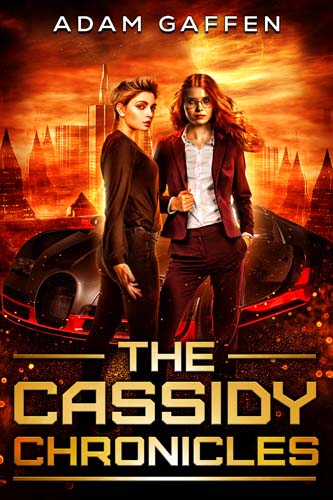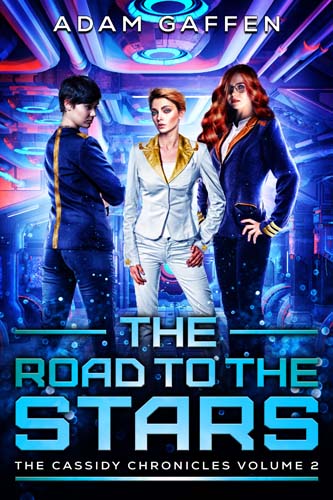I met Adam Gaffen while participating in the DragonCon mentoring sessions. He’s got a process to learning all about his novel’s characters and how that informed his decisions on the novel’s universe.


Today, I’d like to tell you about how I came to meet Cass and Ken, and how the process of getting to know them led me to creating an entire universe for them.
It all started with a name – Aiyana Cassidy. I knew, immediately, that nobody called her Aiyana, that her friends, her family, they all called her Cass. Once I knew that, I started to get a picture in my mind: red hair, glasses, very serious. A woman who could have traded on her looks, but instead relied on her brains. Proved herself over and over, and is now professionally respected. She does something that requires lots of both practical and theoretical knowledge, how about quantum mechanics tied to optical engineering? Then what? Well, who does she hang out with? Kendra, of course. Kendra Foster-Briggs, a friend from her childhood. Friend? No, more than a friend. Wife? Not yet. Fiancée? Yes.
So Kendra’s her fiancée, and…what? Who’s Kendra? Well, she’s blonde and beautiful and a former movie star. She and Cass grew up together in, in, in the Northern Imperium. What’s a Northern Imperium? It’s one of the countries that has replaced the current United States. How did that happen? Gee, I don’t know, and I don’t think they know either. Kendra was too busy chasing boys in school, and Cass was more interested in science than history. And then, and then, what? Cass went to MIT, of course, while Kendra went to get into the movies. No, not movies, sensies. She was the ‘bad girl’ of the two, and ‘sensies’ seems more interactive than ‘movies’. Now it’s years later, and they reunite because Kendra’s retired and Cass is working in Los Alamos. They fall in love, no, they fall back in love, and move in together.
Gee, what a cozy, domestic scene. But it’s not going anywhere yet; it’s static. Gotta move things along, right? What if they didn’t just fall in love with each other, but another person? Who’s that? Derek seems like a good name. Strong, reliable. Rich? Why not? Doesn’t have to work, so he does light sculpture, and that’s how Cass met him and started seeing him casually. Then seriously. Then introduced him to Kendra and was terrified, but they all hit it off, and finally Cass decides to propose to them both. That leads to a wedding. But, let’s see, what would you not expect from a 22nd Century wedding? How about the minister trying to assassinate Cass?
That would be unexpected.
So Cass and Ken and Derek are going to get married, and the minister pulls out a gun, no, a flechette gun, gotta remember it’s 2113, and then they Run Like Hell – hey! That’s a good title for a book! And we’re a going concern!
Now for more complications, and explanations. Figure out what Cass actually does for work. Kendra can’t just be an ex-actress, right? Has to be more to her. Maybe it was a cover? What if she’s semi-retired, but not as much from sensies as her other profession? And now the banter comes out, the snappy wit, the ease and familiarity between Cass and Ken. Kendra’s a fan of late 20th Century/early 21st Century pop culture, did you know that? No, I didn’t, but it makes sense, given some of the things she says.
Now that I knew more or less who they were, I could start putting together some more ideas, more explanations. Cass specializes in optical engineering and quantum mechanics, what if she put the two together and solved the problem of teleportation? That would make some people in the transportation industry very unhappy, wouldn’t it? Definitely! And if Kendra worked for an outfit that did protection for geniuses like Cass, that not only gives a plausible reason for her to go back to them but also tension between Cass and Ken – was it all just a job? And the outfit would also explain Kendra’s ability to deal with hiding in plain sight, and how to cover their tracks, and all sorts of issues.
And their stories just kept coming! So far I’ve written a quarter-million words in their universe, and they’re nowhere near done!
Thanks for dropping by! Now, if you’ll excuse me, Kendra’s tapping on my shoulder.
***
Adam Gaffen hates writing about himself and does so as little as possible. He's spent most of his life dreaming about other times and places, but when he's on this planet he's with his wife, Michaela, and being plagued by their cats and dogs. He's a trained chef who won't work in restaurants, is seeking a degree in Philosophy (Politics, Morality and Law) at Arizona State University, and is busy writing the third volume of The Cassidy Chronicles. He currently lives in Maine but will be relocating to southern Colorado soon, where he's heard the snow actually melts on occasion.